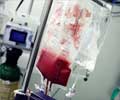The human disease believed to be caused by eating beef from cattle with mad cow disease may also be caused by blood transfusions from infected
The human disease believed to be caused by eating beef from cattle with mad cow disease may also be caused by blood transfusions from infected individuals, say researchers according to a recent study.
In two studies, investigators outline the possibility that the variant form of Creutzfeldt-Jakob disease (vCJD), which has been linked to a prion protein found in cattle with bovine spongiform encephalopathy (BSE), can be transmitted through an intravenous route.The first study analyzed records on CJD patients who had given blood at some point before developing the disease. Results showed 15 donors had given blood to 48 recipients, one of who developed vCJD six and a half years after receiving a transfusion from a donor who gave the blood years before developing the condition.
While the case could be a coincidence -- the patient could have gotten the disease from eating tainted beef rather than from the transfusion -- the authors note statistical analysis shows that is unlikely. Researchers say, “The identification of a case of vCJD who received a blood transfusion from a donor who later died of vCJD raises the possibility that this infection was transfusion transmitted.”
The second study, conducted in monkeys, found the BSE prion is transmitted just as effectively through the intravenous route as the oral route, leading them to conclude, “In view of the high efficiency of transmission of the BSE agent to primates by the intravenous route, the latter should be regarded as a likely route of contamination for vCJD patients with a medical history involving a transfusion during the period at risk.”









